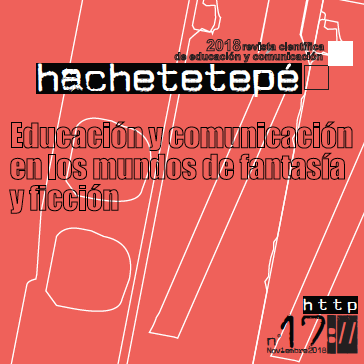On the two hundredth anniversary of Frankenstein: Ethical readings, moral dilemmas and their relation to education in today's society
Abstract
With the excuse of the two hundredth anniversary of the literaty work of Mary Shelley Frankenstein or the modern Prometheus, we deal in this work with the validity and timeliness of the anthropological morals of some of its approaches, paying special attention to its relationship with the educational field. For this, we rescued two fundamental works that will serve as a guide, such as "Pedagogy against Frankenstein" by Santos (2008) and "Frankenstein educator" by Meirieu (1998). Alienation in education, social isolation, responsibility in acts, the functions of educators, authority or respect for freedom in formation, educational inclusion, the moral limits of scientific experimentation or the fight against social homogenization through unique thinking are some topics of great interest in the social that are put on the table in this article that launches many questions, but only one answer: education.
Keywords
Downloads
How to Cite
License

This work is licensed under a Creative Commons Attribution-NonCommercial-NoDerivatives 4.0 International License.
Those authors who have published with this journal, accept the following terms:
- They will retain their copyright and guarantee the journal the right to first publication of their work, which will simultaneously be subject to the Creative Commons Attribution License . They may be copied, used, disseminated, transmitted and publicly displayed, provided that the authorship, url, and magazine are cited, and are not used for commercial purposes. No derivative works are allowed.
- They may adopt other non-exclusive license agreements for the distribution of the published version of the work (e.g., deposit it in an institutional telematic archive or publish it in a monographic volume) provided that the initial publication in this journal is indicated.
- Disseminate your work through the Internet (e.g., in institutional telematic archives or on your website) once the manuscript is accepted, which may lead to interesting exchanges and increased citations of the published work. (See The effect of open access).
Hachetetepé. Scientific journal of education and communication does not charge a fee for the submission of manuscripts or for the publication of its articles.
References
Cabero, J., Amar, V. y Montaner, J. (2008). Tecnologías de la información y la comunicación: más de lo mismo o más y diferente en educación. Revista TAVIRA, 24; 125-141.
Cacheiro, M.L. (2018). Educación y tecnología: Estrategias didácticas para la integración de las TIC. Madrid: Universidad Nacional de Educación a Distancia
Cortina, M. y de la Herrán, A. (2011). Pedagogía de la muerte a través del cine. Madrid: Editorial Universitas.
Dubet, F. y Martuccelli, D. (1996). À l’école. – Sociologie de l´expérience scolaire. Paris: Le Seuil.
Estefanía, J. (1997). Contra el pensamiento único. Madrid: Taurus Pensamiento.
Gómez, M.A. (2017). Los zombis como símbolo cultural contemporáneo: Evolución, características y exploraciones educativas a través de la radio. Hachetetepé Revista Científica de Comunicación y Educación, 14; 39-52.
Gimeno, J. (2015). Los contenidos, una reflexión necesaria. Madrid: Morata.
Meirieu, P. (1998). Frankenstein educador. Barcelona: Laertes.
Muntaner, J.J. (2010) De la integración a la inclusión: un nuevo modelo educativo. En P. Arnaiz, M. D. Hurtado y F.J. Soto (Coords.) 25 Años de Integración Escolar en España: Tecnología e Inclusión en el ámbito educativo, laboral y comunitario. Murcia: Consejería de Educación, Formación y Empleo.
Real Academia Española (RAE) (2017). Definición de moral. Disponible en: http://dle.rae.es/id=Pm2wZfs|Pm4ASgI.
Santos, M. A. (2008). La pedagogía contra Frankenstein y otros textos frente al desaliento educativo. Barcelona: GRAÓ.
Shelley, M. (1818). Frankenstein. Barcelona: Laertes (1994)
Torres, J. (1998). Globalización e interdisciplinariedad: El currículum integrado. Madrid: Morata
Valcarce, M. (2011). De la escuela integradora a la escuela inclusiva. Innovación Educativa, 21; 119-131.






